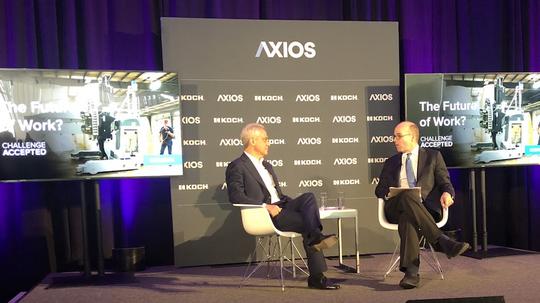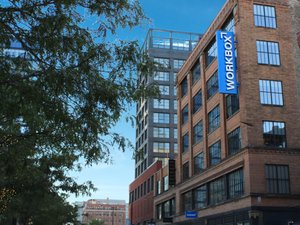
Between all the startups and tech companies operating in Chicago, the area has become full of smart and innovative professionals. But looking at beyond how a tech company can turn a profit on its tech offerings, an Axios event in Chicago Monday morning examined how tech and data could be used to improve the lives of residents in cities.
The event, moderated by Axios’ Co-Founder and Executive Editor Mike Allen, featured Mayor Rahm Emanuel, G.T. Bynum, the mayor of Tulsa, Oklahoma, and Imir Arifi, the head of artificial intelligence and machine learning at Health Care Service Corp., who all discussed how technology and other innovative initiatives can be used to improve how cities work.
“There’s a lot of different interpretations of what a smart city is,” Emanuel said at the event. "My view is using data to be more interactive, focused and tailored to the resident than we are today.”
Chicago is using algorithms to predict crime, particularly shootings, which has drawn criticism. The police department uses these controversial algorithms in some of the city’s more violent neighborhoods, like Englewood, to help foster proactive policing. According to Emanuel, the neighborhood’s shootings are down 67 percent from two years ago since launching the initiative.
“It’s the ability to be in front of a shooting and stop the second shooting, and that’s what I call a smart city—how to use data, how to be more proactive,” Emanuel said. “It’s more expensive on a host of levels to be reactive.”
Other than crime-reducing initiatives, city officials are using tech to innovate Chicago's information hotline, 311. The hotline will soon be able to talk and text back to info-seekers. Additionally, in an effort to provide more energy-efficient lighting to the city, Chicago is changing 270 lightbulbs in street lights across the city, replacing them with LED lightbulbs, a move that could save the city between $8 million and $10 million a year.
“I want to make sure that as we make these changes in mobile technology on 311 or our streetlights, that all communities feel like this is part of helping them, so they feel a part of the city,” Emanuel said. “You have to make sure that the mission of inclusion is always being met.”
To help do so, all Chicago Public School students will be required to take a coding class to graduate, beginning next year. The city announced a new partnership with Apple that aims to teach CPS students to code.

In Tulsa, data and tech has also helped clarify the city's role in education. Through a group called the Urban Data Pioneers, both city officials and local data analysts launched a study to determine what drives high per capita income in the area, and they found it was advanced degrees. Now the city is working to not only ensure that students are graduating from high school, but that they have opportunities to make it to college as well.
“That changed the discussion for us, from being so focused on high school graduation rates and recognizing that that’s an important step, but that’s not the end goal,” Bynum said at the event. “The end goal has to be continuing education as you move on forward.”
Arifi mainly uses his expertise in AI and machine learning in the healthcare sphere in his position at Health Care Service Corp., but said city governments could use them, too.
“In a large enough city with large enough data sets, you could predict both the frequency and severity of certain events,” Arifi said at the event.
This could be useful for determining infrastructure repairs and upgrades, how many residents will need assistance from social services or identifying which students may need more support in the classroom, he said.
"Just like we're applying technology to make healthcare more affordable, accessible and sustainable at Health Care Services Corp., the city of Chicago could use it to make education more effective to improve test scores," Arifi said. "This is not science fiction. This is here now."








